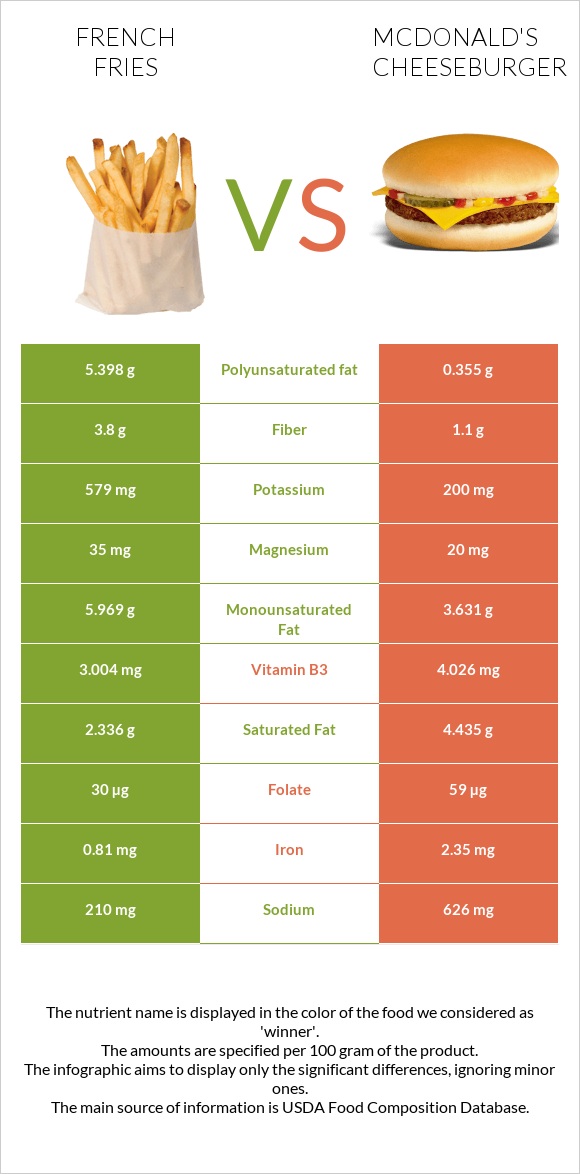French fries vs. McDonald's cheeseburger — In-Depth Nutrition Comparison
Compare
Differences between french fries and mcDonald's cheeseburgers
- French fries have more potassium and fiber, while mcDonald's cheeseburgers have more vitamin B12, iron, vitamin B2, calcium, and zinc.
- McDonald's cheeseburgers' daily need coverage for vitamin B12 is 36% higher.
- McDonald's cheeseburgers contain 3 times less fiber than french fries. French fries contain 3.8g of fiber, while mcDonald's cheeseburgers contain 1.1g.
- The amount of saturated fat in french fries is lower.
The food types used in this comparison are Fast foods, potato, french fried in vegetable oil and McDONALD'S, Cheeseburger.
Infographic

Infographic link
Mineral Comparison
Mineral comparison score is based on the number of minerals by which one or the other food is richer. The "coverage" charts below show how much of the daily needs can be covered by 300 grams of the food.
| Contains more MagnesiumMagnesium | +75% |
| Contains more PotassiumPotassium | +189.5% |
| Contains more CopperCopper | +27.8% |
| Contains less SodiumSodium | -66.5% |
| Contains more SeleniumSelenium | +∞% |
| Contains more CalciumCalcium | +827.8% |
| Contains more IronIron | +190.1% |
| Contains more ZincZinc | +282% |
| Contains more PhosphorusPhosphorus | +12% |
Vitamin Comparison
Vitamin comparison score is based on the number of vitamins by which one or the other food is richer. The "coverage" charts below show how much of the daily needs can be covered by 300 grams of the food.
| Contains more Vitamin CVitamin C | +683.3% |
| Contains more Vitamin EVitamin E | +∞% |
| Contains more Vitamin B5Vitamin B5 | +∞% |
| Contains more Vitamin B6Vitamin B6 | +∞% |
| Contains more Vitamin KVitamin K | +∞% |
| Contains more Vitamin B1Vitamin B1 | +31.2% |
| Contains more Vitamin B2Vitamin B2 | +566.7% |
| Contains more Vitamin B3Vitamin B3 | +34% |
| Contains more Vitamin B12Vitamin B12 | +∞% |
| Contains more FolateFolate | +96.7% |
All nutrients comparison - raw data values
| Nutrient |  |
 |
DV% diff. |
| Vitamin B12 | 0µg | 0.86µg | 36% |
| Polyunsaturated fat | 5.398g | 0.355g | 34% |
| Vitamin B6 | 0.372mg | 29% | |
| Protein | 3.43g | 12.97g | 19% |
| Iron | 0.81mg | 2.35mg | 19% |
| Sodium | 210mg | 626mg | 18% |
| Vitamin B2 | 0.039mg | 0.26mg | 17% |
| Calcium | 18mg | 167mg | 15% |
| Zinc | 0.5mg | 1.91mg | 13% |
| Cholesterol | 0mg | 35mg | 12% |
| Vitamin B5 | 0.58mg | 12% | |
| Potassium | 579mg | 200mg | 11% |
| Fiber | 3.8g | 1.1g | 11% |
| Vitamin E | 1.67mg | 11% | |
| Saturated fat | 2.336g | 4.435g | 10% |
| Vitamin K | 11.2µg | 9% | |
| Folate | 30µg | 59µg | 7% |
| Choline | 36.8mg | 7% | |
| Vitamin B3 | 3.004mg | 4.026mg | 6% |
| Monounsaturated fat | 5.969g | 3.631g | 6% |
| Fats | 14.73g | 11.79g | 5% |
| Vitamin C | 4.7mg | 0.6mg | 5% |
| Carbs | 41.44g | 27.81g | 5% |
| Magnesium | 35mg | 20mg | 4% |
| Vitamin B1 | 0.17mg | 0.223mg | 4% |
| Copper | 0.124mg | 0.097mg | 3% |
| Fructose | 2.59g | 3% | |
| Calories | 312kcal | 263kcal | 2% |
| Phosphorus | 125mg | 140mg | 2% |
| Selenium | 0.9µg | 2% | |
| Manganese | 0.247mg | 0.23mg | 1% |
| Net carbs | 37.64g | 26.71g | N/A |
| Sugar | 0.3g | 6.22g | N/A |
| Trans fat | 0.06g | 0.647g | N/A |
| Omega-3 - ALA | 0.407g | N/A | |
| Omega-3 - Eicosatrienoic acid | 0.001g | N/A | |
| Omega-6 - Gamma-linoleic acid | 0.029g | N/A | |
| Omega-6 - Eicosadienoic acid | 0.007g | N/A | |
| Omega-6 - Linoleic acid | 4.898g | N/A |
Macronutrient Comparison
Macronutrient breakdown side-by-side comparison
Protein:
3.43 g
Fats:
14.73 g
Carbs:
41.44 g
Water:
38.55 g
Other:
1.85 g
Protein:
12.97 g
Fats:
11.79 g
Carbs:
27.81 g
Water:
45 g
Other:
2.43 g
| Contains more FatsFats | +24.9% |
| Contains more CarbsCarbs | +49% |
| Contains more ProteinProtein | +278.1% |
| Contains more WaterWater | +16.7% |
| Contains more OtherOther | +31.4% |
Fat Type Comparison
Fat type breakdown side-by-side comparison
Saturated fat:
Sat. Fat
2.336 g
Monounsaturated fat:
Mono. Fat
5.969 g
Polyunsaturated fat:
Poly. Fat
5.398 g
Saturated fat:
Sat. Fat
4.435 g
Monounsaturated fat:
Mono. Fat
3.631 g
Polyunsaturated fat:
Poly. Fat
0.355 g
| Contains less Sat. FatSaturated fat | -47.3% |
| Contains more Mono. FatMonounsaturated fat | +64.4% |
| Contains more Poly. FatPolyunsaturated fat | +1420.6% |





